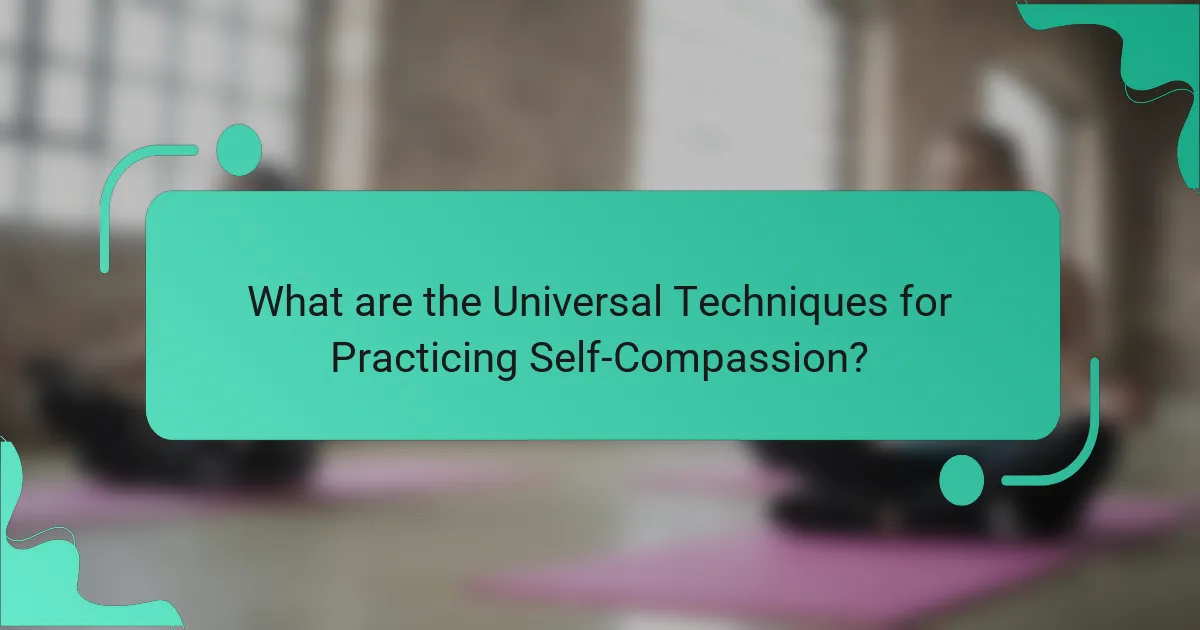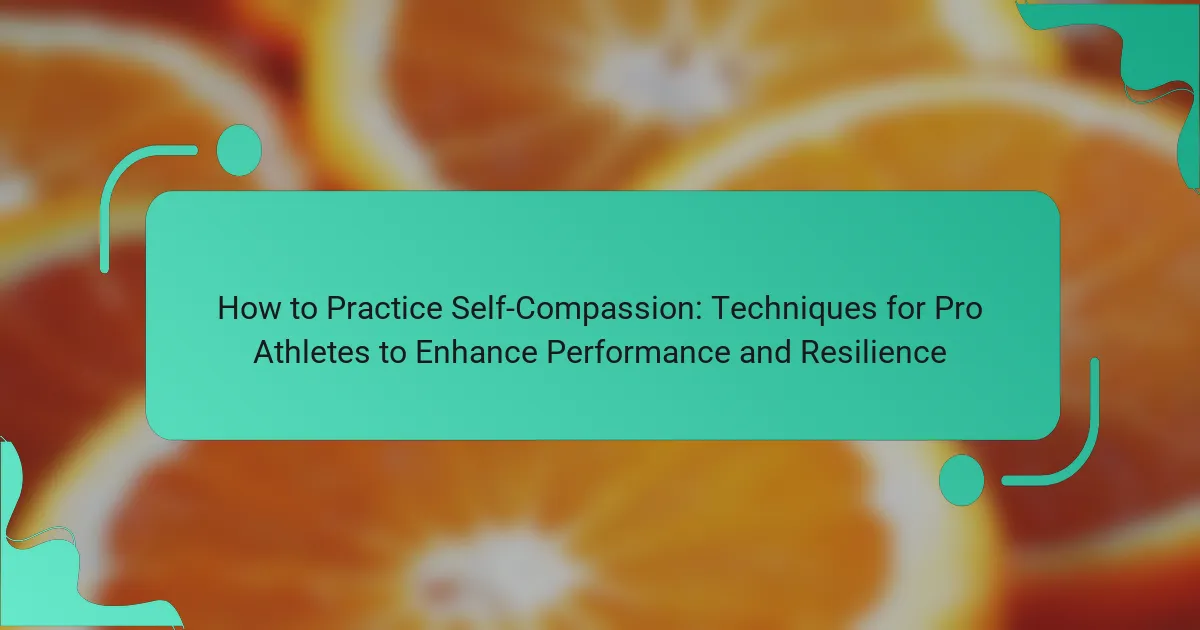Pro athletes often face immense pressure, making self-compassion essential for enhancing performance and resilience. This article explores techniques such as mindfulness, self-kindness, and recognising shared humanity. These strategies help reduce anxiety, foster a positive mindset, and promote emotional regulation. By implementing these practices, athletes can improve their mental well-being and overall performance.

What is Self-Compassion and Why is it Important for Pro Athletes?
Self-compassion involves treating oneself with kindness during difficult times, crucial for pro athletes’ mental health and performance. Techniques to practice self-compassion include mindfulness, self-kindness, and recognising shared humanity. Mindfulness helps athletes stay present, reducing anxiety. Self-kindness encourages positive self-talk, fostering resilience. Recognising shared humanity connects athletes with others, alleviating feelings of isolation. Research shows self-compassion enhances motivation and reduces burnout, improving overall athletic performance.
How does Self-Compassion Relate to Performance and Resilience?
Self-compassion enhances performance and resilience by fostering a supportive internal environment. It encourages athletes to embrace their imperfections and setbacks, leading to improved emotional regulation and motivation. Research indicates that self-compassion correlates with lower anxiety and higher levels of intrinsic motivation, essential for peak performance. Athletes who practice self-compassion are more likely to recover quickly from failures, maintaining focus on growth rather than self-criticism. This mindset shift ultimately supports sustained resilience in high-pressure situations.
What are the Psychological Benefits of Self-Compassion in Sports?
Self-compassion in sports enhances mental resilience, reduces anxiety, and fosters a positive mindset. Athletes practising self-compassion experience improved focus and performance under pressure. Research indicates that self-compassionate athletes recover faster from setbacks, maintaining motivation and commitment. Techniques like mindfulness and self-kindness cultivate this trait, promoting overall well-being.

What are the Universal Techniques for Practicing Self-Compassion?
Self-compassion techniques for pro athletes include mindfulness, self-kindness, and common humanity. Mindfulness helps athletes acknowledge their feelings without judgment, promoting emotional balance. Self-kindness encourages treating oneself with care during setbacks, enhancing resilience. Recognising common humanity fosters connection, reminding athletes they are not alone in their struggles. These techniques collectively enhance performance by reducing anxiety and promoting a positive mindset.
How Can Positive Self-Talk Enhance Self-Compassion?
Positive self-talk significantly enhances self-compassion by fostering a supportive internal dialogue. This practice encourages athletes to treat themselves with kindness during challenges. Research indicates that self-compassionate athletes show improved resilience and performance. By replacing self-criticism with positive affirmations, they can cultivate a growth mindset, leading to better emotional regulation and motivation.
What Are Effective Affirmations for Athletes?
Effective affirmations for athletes focus on self-compassion and resilience. Phrases like “I am strong and capable” and “I embrace my journey” promote a positive mindset. Regularly repeating these affirmations can enhance performance by fostering confidence and reducing self-doubt. Research indicates that self-compassionate athletes often experience lower levels of anxiety and higher motivation, leading to improved results. Incorporating affirmations into daily routines helps athletes maintain focus and cultivate a supportive inner dialogue.
What Role Does Mindfulness Play in Self-Compassion?
Mindfulness significantly enhances self-compassion by fostering awareness and acceptance of one’s thoughts and feelings. Practicing mindfulness allows athletes to recognise self-critical thoughts without judgment, promoting a kinder internal dialogue. This awareness cultivates resilience, enabling athletes to bounce back from setbacks. Studies indicate that mindfulness practices can lead to increased self-compassion scores, which correlate with improved performance and emotional regulation. By integrating mindfulness into training routines, athletes can enhance both their mental well-being and overall performance.
How to Implement Mindfulness Practices in Training?
To implement mindfulness practices in training, athletes should integrate techniques that promote self-compassion. Start with focused breathing exercises to enhance awareness and reduce stress. Incorporate body scans to develop a deeper connection with physical sensations. Utilise guided imagery to visualise successful performances, fostering a positive mindset. Regular reflection on personal experiences can build resilience and improve emotional regulation. Finally, maintain a consistent practice schedule to reinforce these techniques and enhance overall performance.
What are the Benefits of Self-Reflection for Athletes?
Self-reflection enhances athletes’ performance and resilience by fostering self-awareness, emotional regulation, and goal alignment. It allows athletes to identify strengths and weaknesses, leading to improved training strategies. Regular self-reflection can reduce anxiety and increase motivation, creating a positive feedback loop for performance enhancement. Additionally, it promotes a growth mindset, encouraging athletes to embrace challenges and learn from setbacks.

What Unique Self-Compassion Techniques Can Pro Athletes Use?
Pro athletes can enhance performance and resilience through unique self-compassion techniques such as mindfulness meditation, self-kindness practices, and positive self-talk. Mindfulness meditation helps athletes stay present and reduce anxiety, promoting emotional regulation. Self-kindness practices involve treating oneself with the same understanding as one would a friend, fostering a supportive inner dialogue. Positive self-talk encourages athletes to replace negative thoughts with affirmations, boosting confidence and motivation. These techniques cultivate a healthier mindset, ultimately improving athletic performance and resilience in high-pressure situations.
How Can Visualization Techniques Foster Self-Compassion?
Visualization techniques can significantly enhance self-compassion by enabling athletes to cultivate a positive self-image and reduce self-criticism. These techniques encourage athletes to visualise themselves in scenarios where they practice self-kindness, fostering resilience and emotional well-being. For instance, imagining a supportive dialogue with oneself during challenging moments can create a nurturing internal environment. Research indicates that athletes who engage in visualization experience improved mental health outcomes and performance, reinforcing their ability to bounce back from setbacks. This practice not only enhances self-compassion but also contributes to overall athletic performance.
What is the Impact of Peer Support on Self-Compassion?
Peer support significantly enhances self-compassion among pro athletes, fostering resilience and performance. By sharing experiences, athletes develop empathy and understanding, reducing feelings of isolation. This collaborative environment encourages positive self-talk and emotional regulation, essential for mental well-being. Studies indicate that peer support can lead to a 30% increase in self-compassion levels, directly impacting athletic performance and stress management.
How Can Journaling Enhance Self-Compassion Practices?
Journaling enhances self-compassion practices by fostering self-reflection and emotional awareness. It allows pro athletes to process their experiences, recognise self-criticism, and cultivate a kinder inner dialogue. Regular journaling can lead to improved emotional resilience and performance. Research indicates that expressive writing can significantly reduce anxiety and increase self-compassion levels (Pennebaker & Chung, 2011). This practice encourages athletes to confront their challenges and celebrate their achievements, reinforcing a compassionate mindset.

What Rare but Effective Strategies Exist for Self-Compassion?
Pro athletes can enhance self-compassion through unique strategies like mindfulness meditation and self-affirmation. Mindfulness meditation fosters awareness of thoughts and feelings, allowing athletes to respond to challenges without harsh self-judgment. Self-affirmation involves recognising personal strengths and achievements, promoting a positive self-image. These rare techniques can significantly improve emotional resilience and performance under pressure.
How Can Athletes Use Failure as a Tool for Self-Compassion?
Athletes can use failure as a tool for self-compassion by embracing setbacks as opportunities for growth. This mindset fosters resilience and enhances performance. Recognising that failure is a common experience in sports helps athletes develop a more compassionate view towards themselves. Techniques include self-reflection, reframing negative thoughts, and practicing mindfulness. These strategies allow athletes to learn from mistakes without harsh self-criticism, promoting a healthier mental state and sustained motivation. As a result, athletes can transform their failures into valuable lessons that contribute to long-term success.
What Innovative Approaches are Emerging in Self-Compassion Training?
Emerging innovative approaches in self-compassion training focus on integrating mindfulness, cognitive behavioural techniques, and personalised feedback. These methods enhance emotional resilience and performance in pro athletes. For instance, mindfulness practices help athletes cultivate awareness and acceptance of their thoughts and feelings, reducing self-criticism. Cognitive behavioural techniques address negative thought patterns, fostering a more compassionate self-dialogue. Personalised feedback through technology, such as apps, allows athletes to track their self-compassion levels and progress. These advancements contribute to improved mental health and athletic performance.

How Can Pro Athletes Overcome Barriers to Self-Compassion?
Pro athletes can overcome barriers to self-compassion by implementing specific techniques that foster resilience and enhance performance. These techniques include mindfulness practices, self-reflection, and positive self-talk. Mindfulness helps athletes stay present, reducing self-criticism and promoting acceptance. Self-reflection encourages athletes to acknowledge their feelings without judgment, fostering a healthier mindset. Positive self-talk replaces negative thoughts with affirmations, boosting confidence and motivation. By integrating these strategies, athletes can cultivate a compassionate inner dialogue, ultimately improving their mental well-being and athletic performance.
What Common Misconceptions About Self-Compassion Should Athletes Avoid?
Athletes should avoid misconceptions that self-compassion is a sign of weakness or laziness. Self-compassion fosters resilience and performance by promoting a healthy mindset. Many believe that being hard on themselves leads to better results, but research shows that self-criticism can hinder growth and motivation. Embracing self-compassion allows athletes to learn from mistakes without harsh judgment, ultimately enhancing their performance. Additionally, some think self-compassion means ignoring flaws; instead, it encourages recognising imperfections while maintaining kindness towards oneself.
How Can Athletes Address Negative Self-Talk?
Athletes can address negative self-talk by practicing self-compassion techniques. These techniques include mindfulness, positive affirmations, and reframing negative thoughts. Mindfulness helps athletes become aware of their thoughts without judgment, allowing them to respond constructively. Positive affirmations reinforce a supportive inner dialogue, boosting confidence. Reframing negative thoughts shifts the perspective, focusing on growth and learning rather than failure. Implementing these strategies enhances performance and resilience, leading to improved mental well-being.
What Strategies Help in Cultivating a Positive Inner Dialogue?
To cultivate a positive inner dialogue, athletes can adopt several strategies. Practicing mindfulness helps in recognising negative thoughts without judgment. Engaging in self-affirmation reinforces personal strengths and achievements. Journaling promotes reflection on experiences, fostering a constructive mindset. Additionally, seeking social support from teammates or coaches can enhance resilience and provide encouragement.

What Best Practices Should Athletes Follow to Enhance Self-Compassion?
Athletes should practice self-compassion by embracing self-kindness, recognising shared experiences, and cultivating mindfulness. These techniques foster resilience and enhance performance.
Self-kindness involves treating oneself with care during setbacks, rather than harsh self-criticism. Recognising shared experiences helps athletes understand that struggles are common, reducing feelings of isolation. Mindfulness allows athletes to observe their thoughts and feelings without judgment, promoting emotional regulation.
Research indicates that self-compassion leads to improved mental well-being and performance outcomes in sports (Neff, 2003). Athletes incorporating these practices report increased motivation and decreased anxiety, ultimately enhancing their overall performance.
How to Create a Personalized Self-Compassion Plan?
To create a personalised self-compassion plan, start by identifying your specific needs and challenges. Incorporate techniques such as mindfulness, self-kindness, and common humanity. Set realistic goals that align with your performance and resilience objectives. Regularly assess and adjust your plan to ensure it remains effective and relevant.
What are Common Mistakes to Avoid in Practicing Self-Compassion?
To enhance self-compassion, athletes should avoid common mistakes that undermine their practice. Primarily, neglecting self-criticism can lead to increased stress and decreased performance. Additionally, comparing oneself to others fosters feelings of inadequacy. Failing to recognise personal achievements diminishes motivation and self-worth. Lastly, misunderstanding self-compassion as self-indulgence can prevent athletes from embracing this vital practice. Recognising and addressing these pitfalls is essential for cultivating resilience and improving overall performance.
What Expert Insights Can Help Athletes Develop Self-Compassion?
Athletes can enhance self-compassion through mindfulness, self-reflection, and positive self-talk. Mindfulness practices help athletes recognise their thoughts without judgment, fostering a kinder internal dialogue. Self-reflection allows them to understand their emotions and experiences, promoting acceptance. Positive self-talk encourages a supportive mindset, reinforcing resilience and performance. Incorporating these techniques can significantly improve mental well-being and athletic outcomes.
